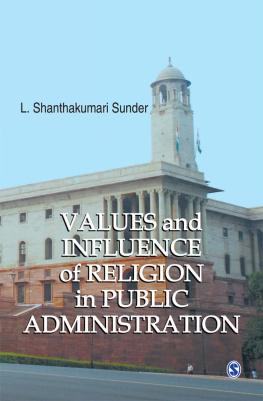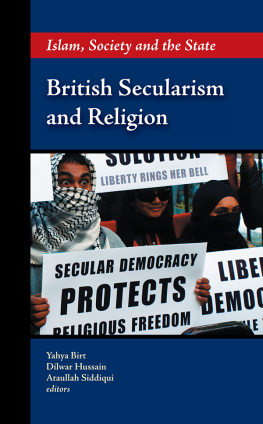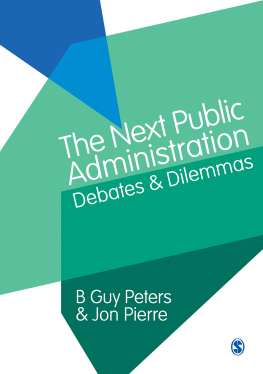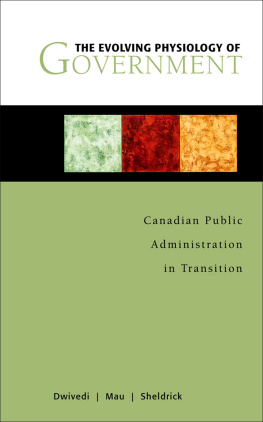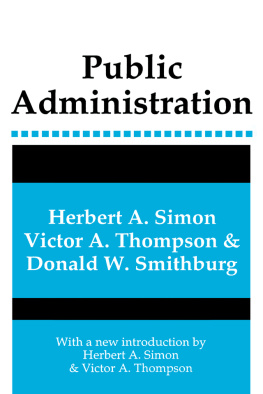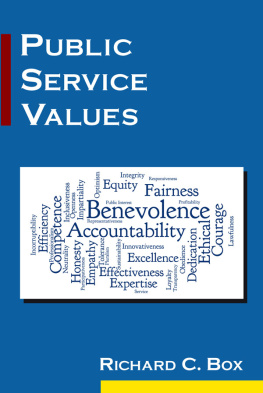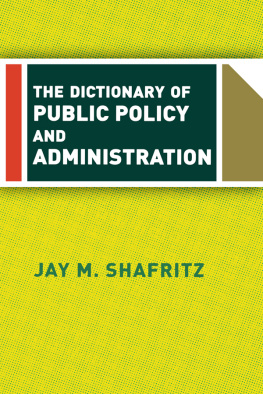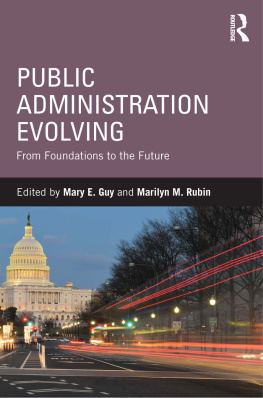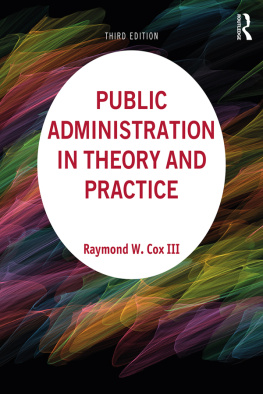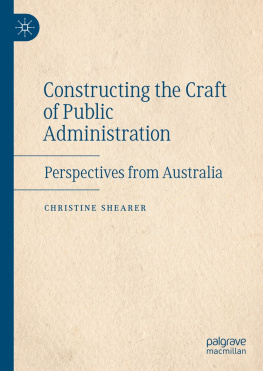L Shanthakumari Sunder - Values and Influence of Religion in Public Administration
Here you can read online L Shanthakumari Sunder - Values and Influence of Religion in Public Administration full text of the book (entire story) in english for free. Download pdf and epub, get meaning, cover and reviews about this ebook. year: 2011, publisher: SAGE Publications, genre: Politics. Description of the work, (preface) as well as reviews are available. Best literature library LitArk.com created for fans of good reading and offers a wide selection of genres:
Romance novel
Science fiction
Adventure
Detective
Science
History
Home and family
Prose
Art
Politics
Computer
Non-fiction
Religion
Business
Children
Humor
Choose a favorite category and find really read worthwhile books. Enjoy immersion in the world of imagination, feel the emotions of the characters or learn something new for yourself, make an fascinating discovery.
- Book:Values and Influence of Religion in Public Administration
- Author:
- Publisher:SAGE Publications
- Genre:
- Year:2011
- Rating:5 / 5
- Favourites:Add to favourites
- Your mark:
- 100
- 1
- 2
- 3
- 4
- 5
Values and Influence of Religion in Public Administration: summary, description and annotation
We offer to read an annotation, description, summary or preface (depends on what the author of the book "Values and Influence of Religion in Public Administration" wrote himself). If you haven't found the necessary information about the book — write in the comments, we will try to find it.
Values and Influence of Religion in Public Administration — read online for free the complete book (whole text) full work
Below is the text of the book, divided by pages. System saving the place of the last page read, allows you to conveniently read the book "Values and Influence of Religion in Public Administration" online for free, without having to search again every time where you left off. Put a bookmark, and you can go to the page where you finished reading at any time.
Font size:
Interval:
Bookmark:
Values and Influence of Religion in Public Administration
L. SHANTHAKUMARI SUNDER

CopyrightL. Shanthakumari Sunder, 2011
All rights reserved. No part of this book may be reproduced or utilized in any form or by any means, electronic or mechanical, including photocopying, recording or by any information storage or retrieval system, without permission in writing from the publisher.
First published in 2011 by
 | SAGE Publications India Pvt Ltd B1/I-1 Mohan Cooperative Industrial Area Mathura Road, New Delhi 110 044, India www.sagepub.in |
| SAGE Publications Inc 2455 Teller Road Thousand Oaks, California 91320, USA | |
| SAGE Publications Ltd 1 Oliver's Yard, 55 City Road London EC1Y 1SP, United Kingdom | |
| SAGE Publications Asia-Pacific Pte Ltd 33 Pekin Street #02-01 Far East Square Singapore 048763 |
Published by Vivek Mehra for SAGE Publications India Pvt Ltd, typeset in 10.5/13.5pt Adobe Garamond by Star Compugraphics Private Limited, Delhi and printed at Chaman Enterprises, New Delhi.
Library of Congress Cataloging-in-Publication Data
Shanthakumari Sunder, L.
Values and influence of religion in public administration / L. Shanthakumari Sunder.
p. cm.
Includes bibliographical references and index.
1. Civil serviceIndia. 2. Religion and politicsIndia. I. Title.
JQ247.S43 351.54dc22 2010 2010047963
ePub ISBN: 9789386042361
The SAGE Team: Rekha Natarajan, Arpita Dasgupta and Deepti Saxena
Dedicated
to
my son, Shawn
I have to acknowledge several well-wishers and professors from South Asian Institute for Christian Studies (SAIACS) for their valuable time and the interest they showed in my work. To name a few, Dr Augustine Pagolu, who organized my two months stay at Wyciffe Hall, Oxford, as a Visiting Research Scholar, which was immensely beneficial to my research on colonial period, as I dug into Bodleian Library, Oxford, and British Library, London. My sincere appreciation to the untiring scrutiny of my work from the beginning to the end by Dr Chris Barrigar, who even after leaving SAIACS kept in touch with me, going through my papers meticulously, correcting them, offering his remarks and responses through e-mail, especially the chapters regarding colonial ethics. Other professors at SAIACS, Dr Ashish Chrispal, Dr Atul Aghamkar, and Dr Graham Houghton, the then Principal of SAIACS, all helped me in various ways to fine tune my work. I appreciate the help rendered by Dr Abraham Stephen, UTC, Bangalore, with regard to the chapter on Hindu Ethics. My sincere appreciation to the Christianity Department, Mysore University, especially Dr Padma Shekar, who took immense interest in my work.
I would like to register my appreciation of the assistance rendered by the staff of the various libraries I had visited. My work at the Government Secretariat Library at Vidhana Soudha, Bangalore; Administrative Training Institute, Mysore; Tamil Nadu Archives and Historical Research, Chennai; National Archives of India, New Delhi; Bodleian Library, Oxford University; and British Library, London immensely enhanced the quality of my research work.
I would like to thank all my colleagues in the IAS, Karnataka cadre, who willingly filled in the questionnaire and underwent the rigmarole of being questioned by me for elucidating their opinion.
Finally, I would like to thank Mrs Devaki Jain who introduced me to SAGE publications for publishing this work and all the assistance rendered by Ms Rekha Natarajan, Senior Commissioning Editor, SAGE Publications and her colleagues in seeing this work through as a book.
Author
T his book is the result of a seven year study that I undertook for my PhD dissertation. It discusses the influence of religion, mainly that of Christianity and Hinduism, on the formation of values in the Indian Civil Service (ICS) and its successor, the Indian Administrative Service (IAS or the Service). The objective of this study is to unearth the reasons for the rapid decline of the values in the IAS, especially after the 1980s. It primarily deals with the problem of administrative corruption in the Service, the premier civil service of the country and also in the Indian society, of which the IAS is a part. However, this book is not about corruption, rather about why there is such rampant corruption in India, especially in the government services, and increasingly so in the IAS. The study has been done with the IAS officers belonging to the cadre of Karnataka as the field of study.
Corruption in India, to say the least, is endemic and systemic. Every day newspapers carry accounts of corrupt deals that are unearthed in the course of casual investigationnot just in the lower echelons of the government but also at high levels. A study by Transparency International (TI) named India Corruption Study, assessed the amount paid by the citizens as bribes in India to be  21,068 crores annually. Such reports bring in a flurry of editorials and opinions from retired bureaucrats, leading politicians and other eminent persons for a day or two in leading newspapers, and thereafter are forgotten, until an-other report brings such a dismal story to light.
21,068 crores annually. Such reports bring in a flurry of editorials and opinions from retired bureaucrats, leading politicians and other eminent persons for a day or two in leading newspapers, and thereafter are forgotten, until an-other report brings such a dismal story to light.
India invariably finds itself at the top of the list of countries most corrupt, as brought out by TI in its annual surveys. TI defines corruption as the abuse of public office for private gain, and measures the degree of corruption perceived among the public officials and politicians of a country. In a score ranging from ten (squeaky-clean) to zero (highly cor-rupt), in its perception index, India's score is 3.3 for the year 2006 and is rated 74th in the list of 163 countries studied and listed. During 2009, India was at the 84th rank with 3.4 on the scale, out of 180 countries. Scams in the various walks of Indian public life are galore, but investigations usually never end in punishment. As already pointed out, this thesis attempts to unearth what could be the root cause for the endemic presence of corruption in the administration in India. The thesis goes beyond the mere what of corruption and corrupt practices, to fathom the why of such prevalent attitudes in Indian society, especially the Service. The study is to find out the roots of the problem, the causes which might arise from culture and finally what goes to make up culture, namelyreligion, traditions, and history. The probe is from a religious point of view, looking at the influences of religion, in this case the majority religion, Hinduism. As the IAS had inherited its value systems from the (ICS), which operated during the British colonial period, the influence of Christianity on the ICS is studied, which in due course passed on its traditions to the IAS.
Ethics is defined as a subject consisting of the fundamental issues of practical decision making, and its major concerns include the nature of ultimate value and the standards by which human actions can be judged right or wrong. It becomes highly relevant when applied to administration and the administrative decisions taken by the administrators in the governance of a countrywhich is public service at large.
Font size:
Interval:
Bookmark:
Similar books «Values and Influence of Religion in Public Administration»
Look at similar books to Values and Influence of Religion in Public Administration. We have selected literature similar in name and meaning in the hope of providing readers with more options to find new, interesting, not yet read works.
Discussion, reviews of the book Values and Influence of Religion in Public Administration and just readers' own opinions. Leave your comments, write what you think about the work, its meaning or the main characters. Specify what exactly you liked and what you didn't like, and why you think so.

